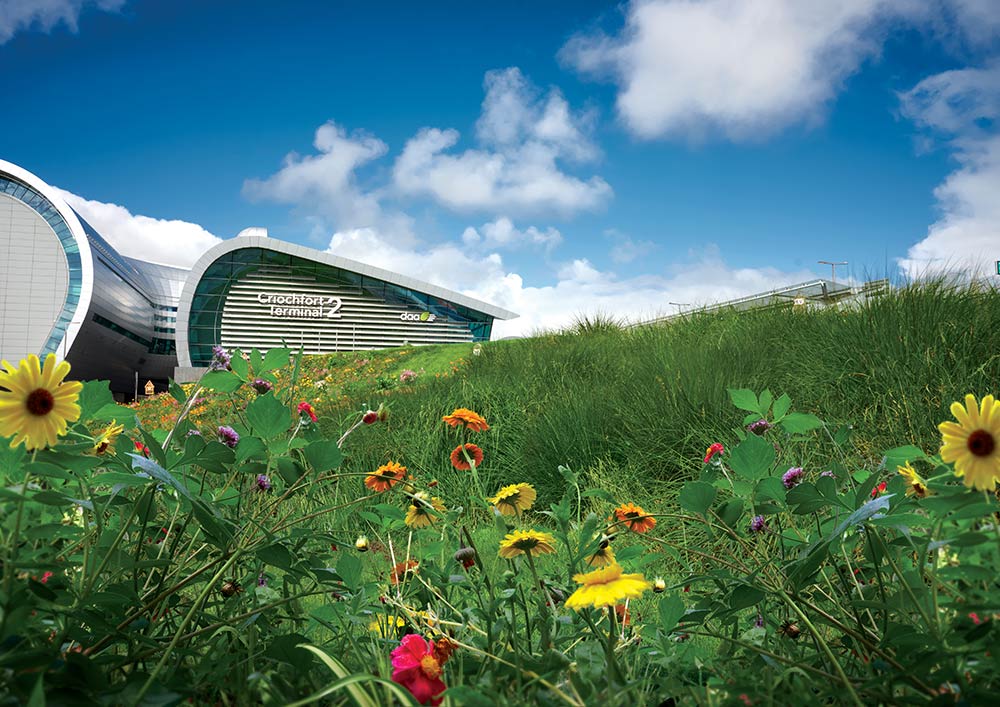Dublin Airport has been shortlisted for a Sustainable Energy Authority of Ireland (SEAI) Leadership in the Public Sector Exemplary Energy Performance Award.
The SEAI Energy Awards were established in 2003 and showcase excellence in sustainable energy. The Leadership in the Public Sector Exemplary Energy Performance Award recognises leadership in sustained energy efficiency and decarbonisation.
Focusing on energy savings and an innovative approach to planning, special projects, engagement, and an improved overall energy performance, Dublin Airport scored highly across the board.
In 2019, Dublin Airport had reduced its energy consumption levels by 48% compared to the average consumption levels in 2006-2008. ((In 2020 Dublin Airport improved its energy efficiency by 61% against 2006-2008, significantly exceeding the public sector target of a 33% improvement))
Dublin Airport reduced its carbon footprint by 12% between 2018 and 2019 and has reduced its overall carbon emissions by 25% between 2013 and 2019, despite a 63% increase in passenger numbers during the same period.
It is the first airport in Ireland to achieve carbon neutral status and has done so following an extensive programme of activities to reduce and offset its carbon emissions in recent years. The accreditation was based on data from 2019.
Dublin Airport has also introduced a wide range of energy management measures in recent years that allow it to monitor and improve its overall energy use across the campus.
The use of building management systems, the installation of efficient LED lighting, a pilot solar farm project and a range of other measures have all helped the airport to significantly reduce its overall energy consumption.
Dublin Airport committed to net zero carbon by 2050 last year along with almost 200 other European airports in a landmark move for the airport industry. The deadline of 2050 was aligned with the decarbonisation strategy set out by the European Commission and adopted by the Council of the European Union.
Dublin Airport’s plans include moving all its light vehicle fleet to Low Emission Vehicles (LEVs) by 2024 and building a second solar farm on campus with a capacity of 7.5MWp. This will contribute 10% of our total annual electricity requirements, with the potential to generate up to 7.5 megawatts of power. This is enough to fully power over 1,000 houses for one year.
To achieve its Level 3+ carbon neutrality status, Dublin Airport had to work to reduce CO2 emissions from multiple sources under its control which includes electricity, gas, oil and diesel and to compensate for the remaining residual emissions through investment in internationally recognised high-quality carbon offsets.
Dublin Airport works closely with global climate finance and carbon neutrality specialist Natural Capital Partners to purchase carbon credits from an improved water infrastructure project run by Irish Non-Governmental Agency Vita in East Africa. The credits provide essential funds to restore community water points and enable easy access to clean water for rural families in Ethiopia and Eritrea.
By drilling new boreholes and repairing existing ones, communities no longer need to boil their water to purify it and this reduces pressure on local forests – the main source of firewood – and reduces greenhouse gas emissions.
A comprehensive energy monitoring system at Dublin Airport which provides real time information on energy performance has been vital in providing the data required to assess realistic energy savings from projects, helping the business case for energy efficiency projects.
Dublin Airport’s energy reduction journey is a result of staff from across the business to achieving their goals and is not just limited to the work of the energy team.
Further initiatives undertaken include:
- A brighter road network within Dublin Airport. All street and car park lighting have been redesigned and upgraded to LED with a control system to allow for remote management of run hours and lighting output. The project ensures the safety of our road network while delivering over 220 tons of carbon savings.
- Dublin Airport was the first airport in the world to be awarded the ISO standard for Asset Management, ISO55001:2014, allowing the organisation to consistently meet or exceed performance with respect to sustainable asset management. Dublin Airport has been ISO50001 certified since 2016 which firmly embeds energy management into the organisation’s operations.
- The addition of EV Car chargers on campus supports the rollout of the use of electric vehicles in our company fleet, and also for employees and other airport users.
- Fixed Electrical Ground Power Units have been installed on Piers 1,3,4. These units produce far less emissions than a traditional diesel generator while a plane is parked at a stand which is beneficial to both those working on the apron and the environmental.
- T2 Thermal storage Project – an exciting project whereby Dublin Airport will maximise 3.0MW combined heat and power (CHP). This project will increase the operational efficiency and improve the load management of the CHP, delivering nearly 400 tons of carbon savings
- Since 2013 LED lighting upgrades have been completed across the terminals, campus buildings and runways with an estimated carbon reduction of 2,500 tons
These initiatives all form part of Dublin Airport’s overall sustainability programme which includes a commitment to the Airport Council International (ACI) airport carbon accreditation programme which will result in an increase in the number of electric vehicles on the airport campus, harvesting honey from beehives on airport land and a solar farm which supplies more than half of the energy required for the airport’s reservoir.
Winners will be announced by SEAI next month.
Over 2.9 million passengers have travelled through Dublin Airport in the first eight months of this year, representing an 87% decrease when compared to pre COVID levels in 2019.
